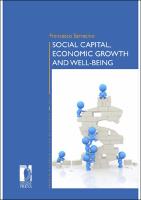Social capital, economic growth and well-being
Abstract
In the long run economic growth does not improve people's well-being. Traditional theories – adaptation and social comparisons – explain this evidence, but they don't explain what shapes the trend of subjective well-being and its differences across countries. Recent research identified in social capital a plausible candidate to explain the trends of well-being. This dissertation adopts various econometric techniques to explore the relationship over time among social capital, economic growth and subjective well-being. The main conclusion is that social capital is a good predictor of the trend of subjective well-being, both within and across countries. Hence, policies for well-being should aim at preserving and enhancing social capital for the quality of the social environment matters.


 Download
Download Web Shop
Web Shop